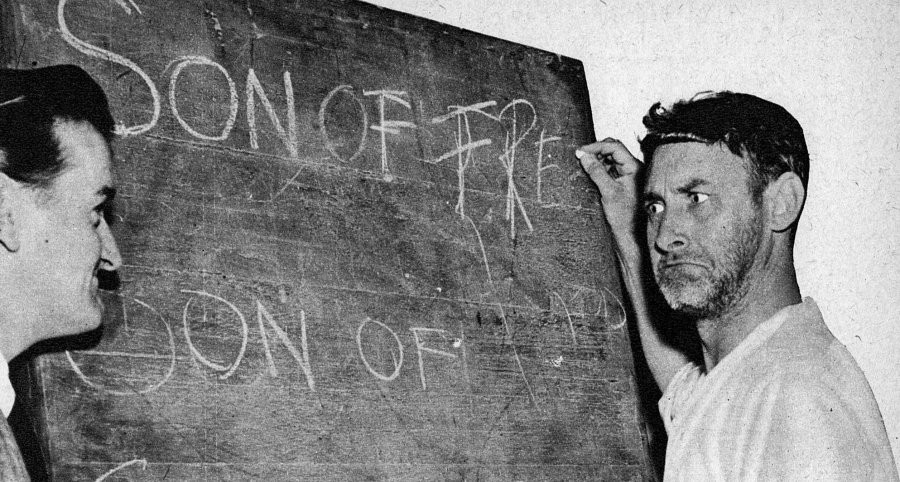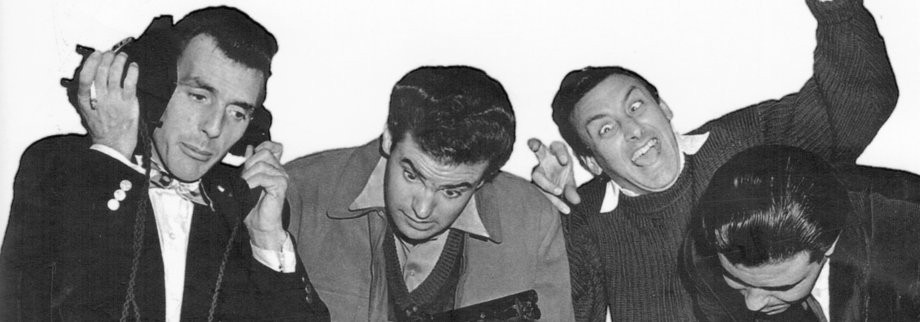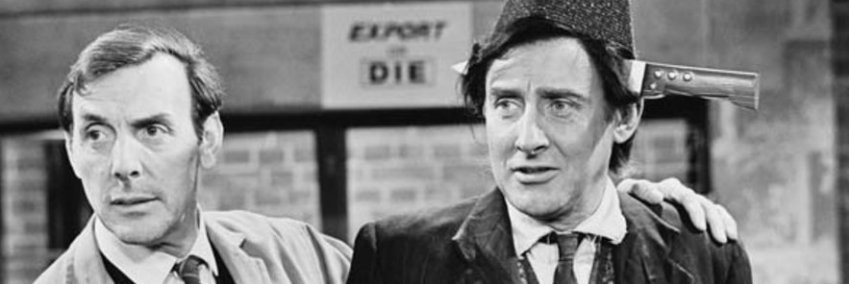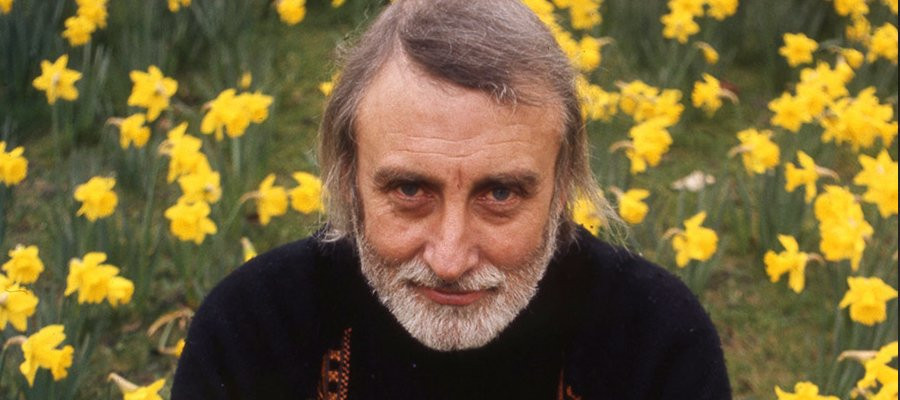
Spike Milligan
Spike Milligan was born Terence Alan Milligan on the 1st April 1918 in a hospital in Ahmednagar, India. When he grew up he wrote the Goon Show and died.
With typical irreverence comic genius Spike Milligan, who did in fact keep his promise -and died, wrote the above self-obituary in 1990. What he omitted to mention was that between creating the Goon Show and dying he left behind a comic legacy that was not just the inspiration for a generation of comedians that were his contemporaries, but for succeeding generations of mirth-makers the world over. Spike Milligan was the founder of modern comedy.
Terence Milligan was in fact born on 16th April 1918 and was educated at the Convent of Jesus and Mary in Poona, where his father was serving in the British Army. In 1933 the family moved to England and young Milligan attended London Polytechnic in Lewisham. Within months of the outbreak of World War ll Spike volunteered for active service and joined the 56 Heavy Artillery. He survived the successful campaign in North Africa but was wounded at Salerno in Italy during an assault on Monte Cassino in January 1944, and also suffered severe shellshock. No longer suitable for active service, Milligan, on his recovery was transferred to the Army Welfare's General Pool of Artists. He was a musician and played in the Bill Hall Trio and it was here that he met Leading Bombardier Harry Secombe who at that time was doing a comedy act, and the two became firm friends.
After the war Milligan decided to go solo but apart from getting the occasional engagement he was unable to make a major breakthrough as a jazz musician. In order to support himself Milligan worked behind the bar at Jimmy Grafton's pub in Victoria, London. The Grafton Arms has often been described as a 'hotbed of eager ex-Forces writing and performing talent' and Grafton himself was employed as a scriptwriter for comedian Derek Roy's radio show. Milligan began to contribute bits and pieces for the show including a number of sketches that he himself described as "way out things which were consistently cut out." However, the rejected items appealed to Harry Secombe and he in turn brought them to the attention of two other Grafton Arms frequenters, Peter Sellers and Michael Bentine. Together with Milligan they wrote a series of sketches which they offered to the BBC. On May 28th 1951 they broadcast their first series of shows under the title of The Crazy People.
Speaking of the things that made them laugh back then Milligan said; "We all had this lunatic sense of humour which I suppose was resentment of what the adult world had done to us." With typical irreverence he said of the war; "If it weren't for all the death it would have been the greatest comedy show in the world. All those men, hiding, leaping out of holes, swearing at each other, getting covered in mud." It's no wonder that many men returned from the war with not only their hearts but also their minds broken. Some of the lucky ones found an outlet for the lunacy they had witnessed. "We turned everything into imbecility," said Milligan. "We were a crowd of idiots existing as idiots together and doing things like climbing Mount Everest from the inside."
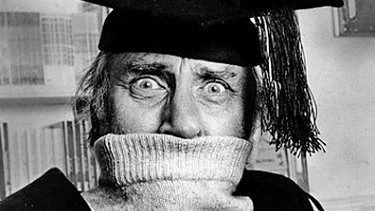
Whether the rest of the British public was ready for this new brand of humour is questionable, but that first series, co-written with Larry Stephens, was a hit and miss affair without any real structure. However, it sufficiently impressed BBC bosses enough for them to order a second series with a single plot format and a new title -The Goon Show. At the end of this second series Michael Bentine decided to go solo and Milligan continued to collaborate with Stephens and they were now joined by Jimmy Grafton and Eric Sykes. This trio took over the scriptwriting chores for a while when Milligan suffered a nervous breakdown during series three. Various forms of depression were to dog Milligan throughout his life, a legacy of the shellshock he had suffered during the war. On his return to work Milligan became sole scriptwriter for The Goon Show writing at a rate of around 26 shows a year.
It was at this point that the series really took off as around 4.5 million listeners a week tuned in to hear the maniacal antics of (amongst others) Neddy Seagoon, Eccles and Bluebottle (Secombe, Milligan and Sellers). In addition to the radio scripts in 1959 Milligan and Sellers scripted and starred in The Running, Jumping and Standing Still Film, which was nominated for an Oscar. Although Milligan later tried to break into the movies he became disillusioned with the big screen and later stated "I made three 'comedy' films under the direction of idiots at MGM. I had no say in the writing and direction and it showed."
In 1951 the BBC attempted to transfer the lunacy of The Goon Show to the small screen with a 45-minute special entitled Goonreel, a version of a television newsreel done in typical Goon style and starring Milligan, Bentine, Sellers, and Secombe. Also appearing were Graham Stark, Sam Kydd and Leslie Crowther. The script was written by Milligan, Bentine and Grafton and was originally to have been shown as Trial Gallop earlier that year, but was delayed following the death of King George V1.
Oddly it was commercial television and not the BBC that first produced a successful version (of sorts) of The Goon Show for the small screen with a 1956 series screened only in the London area entitled The Idiot Weekly, Price 2d. The series scripts were accredited to Spike Milligan and Associated London Scripts a co-operative based in London that encompassed the writing talents of John Antrobus, Brad Ashton, Dick Barry, Dave Freeman, Ray Galton, John Junkin, Eric Merringham, Spike Milligan, Terry Nation, Lew Shwarz, Alan Simpson, Johnny Speight and Eric Sykes. On screen the series brought together the comedic talents of Sellers, Milligan and Sykes as well as Kenneth Connor, Graham Stark and June Whitfield. The series was immediately followed by A Show Called Fred (also London only), scripted solely by Milligan and directed (as before) by Dick Lester.
A Show Called Fred in turn begat Son of Fred, a very significant series in the development of TV comedy. By now Milligan was growing tired with the standard format of sketch-show comedy and began to experiment with more off-the-wall humour, sketches without a real tag line and animated sequences. It was arguably here that the seeds of future generations of sketch shows (most notably Monty Python) were sewn, although it would be some years before those seeds would fully blossom. Evidently the British public were not ready for this type of humour yet and it was eight years before Spike Milligan would be given another sketch show with 1964's Milligan's Wake.
Following The Last Smoking Seagoon on 28th January 1960 there were no more radio Goon Shows except for a 1972 reunion to celebrate 50 years of the BBC appropriately entitled The Last Goon Show of All. In 1963 the BBC produced The Telegoons, 26 fifteen-minute episodes of radio Goon Show soundtracks (with special material recorded where required) realised with puppet versions of the characters whose images were based on doodled impressions by Milligan of how they might look.
For most of the 1960's Spike Milligan continued to appear on television, radio and in the theatre whilst writing a series of books based on verses he'd written for his own children. Titles such as Silly Verses for Kids, A Dustbin of Milligan and The Little Pot Boiler were followed by volumes of his war memoirs starting with Adolf Hitler - My Part in His Downfall. His first novel, Puckoon, published in 1963, was about the partitioning of an Irish village, and became a best seller. When he wrote it, he had never been to Ireland.
In 1969, several months before the birth of Monty Python on British TV screens, Milligan returned with his own anarchic sketch show called Q5. The writer and TV critic Mark Lewisohn describes the series as one that "crossed the lines of decency and taste in a quest to take comedy into unexplored territory." To describe the series as organised chaos would be incorrect because there were times when the show seemed devoid of any organisation whatsoever. The public lapped it up and Q5 (followed by 6, 7, 8 and 9) continued until 1980 with the final series (renamed There's a Lot of it About) broadcast in 1982. Milligan's fascination with language and the grotesques of everyday life took humour to levels that, even today, rate a debt of gratitude from writers and performers alike. As comedy actor and writer John Cleese would point out; "It's hard for people to recall just how stuffy, correct and deferential English society was in the fifties. But with the Goon Show there was the first flicker of rebelliousness that progressed into the satire movement." Recalling the effect that Milligan had on Monty Python, Cleese stated; "He moved us forward to be even crazier than we were intending." Comedian Eddie Izzard described him as the "godfather of alternative comedy". He said; "He was a great man. He was a crazy, wonderful genius." Broadcaster Michael Parkinson said Milligan was "indisputably the most important person in British comedy over the last 50 years".
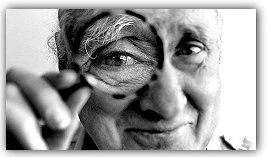
In later years Milligan's contribution to comedy was recognised with an honorary knighthood even though at one time he joked that he had blown his chance of royal recognition. During a live television show in 1994 he referred to Prince Charles, a lifelong Goon fan as a "grovelling bastard". He later sent a fax to the prince saying: "I suppose a knighthood is out of the question now?" He campaigned against cruelty to animals, damage to the environment, smoking in public places and for compulsory contraception in developing countries. Always in the background though, there was the shadow of depressive illness. In October 1990 he was admitted to a psychiatric hospital suffering from another bout of depression after the death of his mother.
In his later years Milligan admitted to a certain bitterness towards the BBC for having put The Goon Show and the Q series' on minority channels, and most of all for returning his later scripts marked 'unfunny'. In the year 2000 he accepted the role of decrepit headmaster De'ath in the BBC adaptation of Mervyn Peake's Gothic masterpiece Gormenghast.
Spike Milligan wrote The Goon Show and then died on 27th February 2002. In between he created modern comedy and defined the term comic genius. As comedian Stephen Fry acknowledged; "If there is a definition of genius it is that whatever province you are in, you leave it different. He left comedy different and it was never the same after him."
Published on February 20th, 2019. Written by Laurence Marcus (2002) for Television Heaven.


